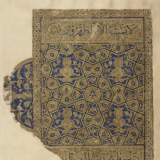History of surah The Consolation

Name
Surah Al-Sharh has been so called because it reports the "declaration" of God - praised be He - to the heart of his Prophet Muhammad - may God bless him and grant him peace - and the meaning of this " Al-Sharh " is that his heart - upon him be blessings and peace - was filled with wisdom, faith, guidance and righteousness, and this came at the beginning of the Surah In an explanatory question to prove this " Al-Sharh ", it is also called Surat Al-Inshirah
Period of Revelation
Surat Al-Sharh is one of the Meccan Suras that was revealed to the Messenger of God - may God bless him and grant him peace - before the migration, and it was revealed after Surat Al-Duha.
As for the reason for the revelation of the Surah, it is documented in the books of Al-Sahih that the Prophet - may God bless him and grant him peace - asked his Lord for a request and then repented of it. And the request that He may give him what He gave the prophets before him in miracles, such as reviving the dead, controlling the winds, and others. Thus, God, may He be glorified and exalted, has communicated to him in a Quranic text the blessings with which He is grateful to him, namely: opening of his chest to the truth and faith, honorable manners, protection after orphanhood, guidance after misguidance, wealth after poverty, and elevation of standing in the worlds.
Theme and topics
Declaration of the blessings of God - the Almighty - on His prophet and the preparation of his heart and its declaration to receive the prophecy and to transmit it to all mankind and to bear the burdens associated with it.
A declaration to elevate the status of the Prophet by associating his name with the name of God - the Almighty - in the call to prayer and the Iqama, so that his memory is elevated among people as a result.
To remind Prophet Muhammad - may God bless him and grant him peace - that toil and hardship are followed by ease.
The need to engage in worship. Just as God Almighty told his prophet to devote himself to worship after imparting religion.
The emphasis on the need to turn to God Almighty alone with the question, and not to ask others.